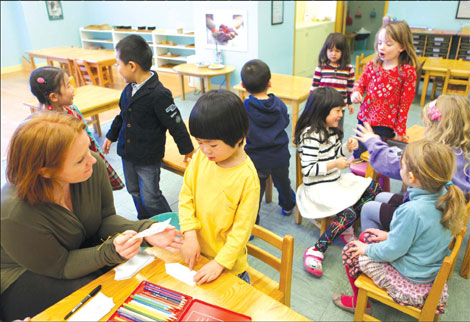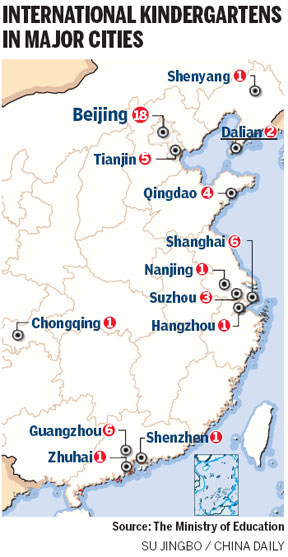No child's play
Updated: 2011-04-01 10:29
By Zhong Nan (China Daily European Weekly)

Kay Findley, from Britain, teaches a class of Chinese and foreign students at Children's House in downtown Beijing. Zhang Tao / China Daily |
Chinese parents face limited places for children at increasingly popular Western kindergartens
The mother of the 2-year-old boy looked distraught. Her dream of getting her son into one of Beijing's top kindergartens had just been shattered.
"Madam, our classes are full at the moment," Yan Wei, assistant to the principal of Ke Er International Kindergarten in Beijing, tells her. "But if you pay an application fee now, you'll ensure your son's place. Still, you will have to wait at least a few months for a vacancy."
Yan has to play out this scene almost every day with an increasing number of parents - local Chinese and foreigners alike - as the demand for Western-style kindergartens grows dramatically.
This is despite the fact that these internationally run kindergartens are not cheap.
Ke Er, for example, demands a 5,000-yuan (537 euros) application fee, and a 5,500-yuan monthly fee. (Locally run public kindergartens charge between 500 yuan and 1,700 yuan a month.)
Once Ke Er, a recognized Montessori kindergarten, accepts a child, the
|
 |
This 900-square-meter kindergarten occupies a two-floor building, two playgrounds and 150 registered children divided into 10 classes.
Three employees, a foreign teacher and two local English-speaking teaching assistants, manage and teach each class of 15 children.
Montessori kindergartens, which can be found worldwide, follow the teaching approach based on research by early 20th century Italian education expert Maria Montessori.
About 300 Chinese and internationally owned kindergartens in Beijing use the Montessori method.
Liu Zhanlan, deputy director of the World Organization For Early Childhood Education's China committee in Beijing, says the demand for European-style kindergartens is not confined to first-tier cities, but is also taking place in second-tier cities, thanks to growing wealth and higher incomes.
"Kindergarten education has gradually diversified amid economic prosperity," Liu says.
"More European-style kindergartens are emerging in China's major cities. The potential of this market will be profitable and attractive to both foreign and domestic investors."
Etonkids International Educational Group, a large-scale Montessori education provider that owns 24 kindergartens in Beijing, Tianjin, Shanghai, Nanjing and Guangzhou, is planning to glean more from second-tier cities this year.
"We are very confident of meeting the needs of wealthy parents across China. Our group will open another 16 more kindergartens in Jinan, Chongqing, Chengdu and Zhengzhou in 2011," says Liu Siqi, market manager of Etonkids International Educational Group.
Senior kindergarten teachers from overseas - particularly those from the United Kingdom, Ireland, the Netherlands, the US and Australia - can earn generous salaries in major Chinese cities.
A principal at a kindergarten run by Etonkids International Educational Group in Beijing can earn more than 400,000 yuan a year.
E-paper

Pearl paradise
Dreams of a 'crazy' man turned out to be a real pearler for city
Literary beacon
Venice of china
Up to the mark
Specials

Power of profit
Western companies can learn from management practices of firms in emerging economies

Foreign-friendly skies
About a year ago, 48-year-old Roy Weinberg gave up his job with US Airways, moved to Shanghai and became a captain for China's Spring Airlines.

Plows, tough guys and real men
在这个时代,怎样才"够男人"? On the character "Man"
